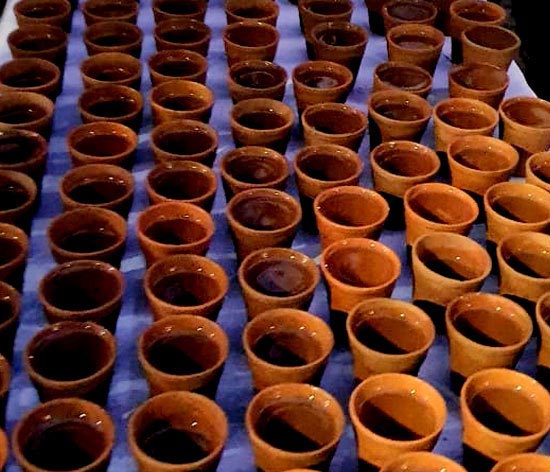
The Centre for Technology and Design was set up in IIT Bombay in 2014, with support from the Tata Trusts, to develop innovative and implementable solutions to challenges faced by society. The centre mentors a student group called Team Zero Waste, which comprises students from various programmes and disciplines at the institute. Team Zero Waste aims to improve the management of waste at IIT Bombay and to reduce the amount of waste going to the Kanjurmarg landfill.
A shift from plastic to clay
Each year, the IITB Half Marathon is organised by Fitizen India in the IIT Bombay campus. Around 4,000 people from within and outside the campus participate in the event. Last year, around 13,000 PET bottles were used to quench the thirst of the runners. This year, Team Zero Waste, led by Senior Project Managers Anupriya Aggarwal and Alok Kumar Gupta, decided to replace the plastic bottles with an environmental-friendly substitute.
Paper cups, a seemingly obvious alternative, was ruled out as they are practically and economically hard to recycle, contrary to popular belief, due to a thin film of plastic that is stuck on its inside to make it waterproof. They zeroed in on earthen cups. Care was also taken to find local vendors to reduce the carbon footprint of transportation and delivery. Asians Tiger, a group of artisans, offered to make 13,000 kulhads (baked clay glasses) as an alternative to plastic bottles.
A team of 100 volunteers comprising students, faculty members and residents from the campus participated in transportation, cleaning, filling and post-use segregation of the kulhads. Some runners went a step ahead and decided to pour the water directly into their mouths (a practice common in India) so that it can be used multiple times by refilling.
Impact figures
A small empty PET bottle of 250ml weighs approximately 12g. If discarded in the usual way, 13,000 PET bottles would have generated approximately 12g x 13,000 = 156kg of plastic waste, which was avoided this year. Further, the carbon footprint of PET is about 6kg of CO2 per kilogram of plastic. So, the initiative led to a reduction of 936kg of CO2 emissions.
Moreover, plastic water bottles have an unexpectedly large water footprint. According to Fresh Water Watch, plastic bottles take about three times as much water to produce than they can actually hold. So, the water footprint of 13,000 PET bottles would have been around 10,000L. Compared to that, the water footprint of kulhads was significantly lower, which is estimated to be 3,500L, including making and washing. An attempt was made to think through the entire lifecycle of the product used to replace the plastic bottles. To avoid sending the used kulhads to a landfill, they were collected and sent to Prof Bakul Rao’s lab at the Centre for Technology Alternatives for Rural Areas, IIT Bombay, to be used in a wastewater treatment project.
An inspirational effort
The response to the first half-marathon in India that was free of plastic bottles has been overwhelmingly positive. Dr Ankita Asthana, the marketing head of Fitizen, said: “This marathon would be an inspiration to conduct all other marathons in a plastic-free manner.” Participants also praised the uniqueness of the initiative and shared their views about the replacement of plastic with kulhads. Many participants remarked that this was the first marathon with such an initiative and they were glad to be a part of it. Several participants took their used kulhads home as souvenirs. Several others responded positively to the appeal by Team Zero Waste by bringing their own reusable water bottles. One of the participants, a regular marathon runner who has participated in 70 marathons, remarked: ‘It is the first time I have actually seen such an initiative where the message of going plastic-free is not just limited to slogans and banners, but has been actually implemented in practice.”
In addition to the tangible reduction of carbon and water footprint due to this initiative, there were many other benefits that were not easily measurable — such as the effect of not releasing a portion of plastic into the environment (around 90 percent of plastics are never recycled); the impact of supporting local industries that provide sustainable products; the social impact of collectively practising waste segregation on a community level. The team provided segregated-at-source material — 15kg of extraneous plastic, 4kg aluminium cans and 3kg of cardboard — to sanitation workers of Stree Mukti Sangathan, who otherwise would have had to manually segregate this from mixed waste.
For the residents of IITB campus, a noticeable change this year was the absence of littered plastic bottles at the end of the event. A resident commented that "instead of complaining that such large-scale events make the campus dirty, the campus community came together as one to act on keeping it clean."
There are thousands of other events in Mumbai and the world over where plastic bottles are distributed. Perhaps, this initiative will inspire different groups aiming to reduce plastic consumption and waste to come together and join forces for lasting changes at larger scale.
